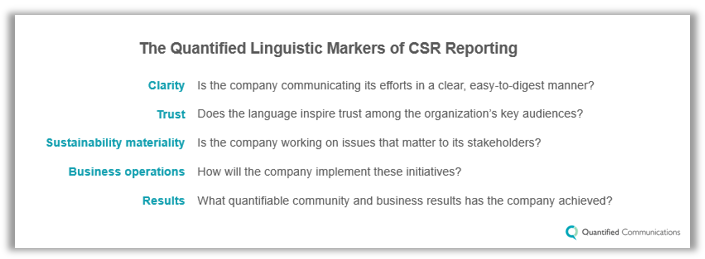The business imperative to effective sustainability reporting

By Jeff Helfgott and Robert Ludke
Research has proven it is important for companies to communicate their sustainability efforts, but what is the most impactful way to communicate these initiatives?
In the last five years, we’ve seen a marked increase in the number and sophistication of sustainability reports created by companies around the world.1 This boom in proclaiming corporate sustainability is driven by the tangible benefits companies are realizing from communicating their sustainability efforts:2
- Consumers are more likely to buy products or express support for brands perceived as operating in a manner that benefits society.
- Companies that make a commitment to sustainable business operations enjoy lower borrowing costs, better employee performance and an ability for the corporate reputation to better withstand a crisis.
Based on our work helping companies improve their sustainability initiatives, Quantified Communications created a three-part framework to guide our clients’ efforts to communicate their sustainability efforts.
- Use data analytics to refine your corporate social responsibility (CSR messaging).
- Engage your stakeholders in their preferred channels and format.
- Share frequent updates on your sustainability initiatives. In other words, move away from the mindset of producing an annual “sustainability report” and into one with an ongoing reporting process in which the content is updated regularly.
-
Analytics leads to an effective sustainability report
Through its predictive analytics platform, Quantified Communications has analyzed the content of more than 1,000 sustainability reports from Fortune 500 companies. We identified patterns of the most critical language measurements of sustainability communications:
A study of Fortune 500 companies’ 2013 sustainability reporting revealed that all companies invest in communicating their sustainability efforts material to Business operations, the company’s overall Business operations, and Community and Business Results.
Interestingly, companies that have reputations as leaders (best practice) within sustainability reporting (e.g. UPS, Unilever, Mars, etc.) communicated with higher levels of Clarity and Trust than other Fortune 500 companies.
This supports the assertion that in order to grow a reputation as a sustainability leader, companies need to communicate their sustainability initiatives in a way that is clearly understood and builds trust with their stakeholders.
-
Engage your stakeholders in their preferred channel and format
Sustainability reporting must adapt to the changing nature of how the public consumes information. No longer do people want information given to them in a static document. Instead, they want the ability to gain information “on demand” through a number of channels, ranging from video to social media platforms to traditional news reports. Thus, a company’s sustainability reporting process must include a number of approaches to reach and engage stakeholders.
-
Share frequent updates on your sustainability initiatives
According to research conducted by Hill+Knowlton Strategies, the most credible format for a company to communicate its sustainability initiatives is through regular updates on a website managed by the company. Whereas 81% of the public prefer ongoing reporting, only 19% want a static report produced once a year. Moreover, 82% of the public believes ongoing sustainability reporting is an effective way for a company to repair a reputation damaged by a crisis. For example, companies such as Walmart, GM, Coca-Cola, Nike and BP increased the cadence of their sustainability reporting as a way to change the narrative around the company following a crisis or series of events that impacted their brand and reputation.
The importance of effective sustainability language
Sustainability reporting, when it’s done effectively and transparently, is a recognized best practice that generates tangible benefits to the bottom line and reputation of a company. However, it is not enough for companies to operate sustainably. They must also produce ongoing communications efforts around those sustainability initiatives that engage the public in a meaningful way. Those that do it well will have a competitive advantage over those that do not.
To learn more about how we can help your team use data to improve your sustainability communications, contact us at info@quantifiedcommunications.com.
About Robert Ludke
Robert Ludke has 20 years of professional experience with a career ranging from working for the U.S. Senate and House of Representatives to teaching at the United States International University in Nairobi, Kenya. Most recently, Ludke spent over a decade at Hill+Knowlton Strategies were he established the firm’s Governance+Sustainability practice and developed H+K’s first sustainability report. Ludke continues to provide counsel to organizations on sustainability best practices.
- The number of reports filed under the world’s most recognized sustainability reporting framework – the Global Reporting Initiative – increased from nearly 1,400 reports in 2010 to over 5,000 at the end of 2014.
- For consistency sake this document uses the term “sustainability” as an overarching concept to include sustainability, corporate responsibility and corporate social responsibility efforts.

